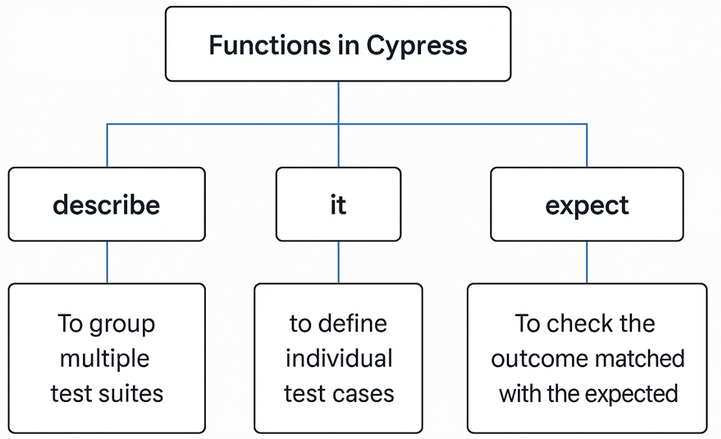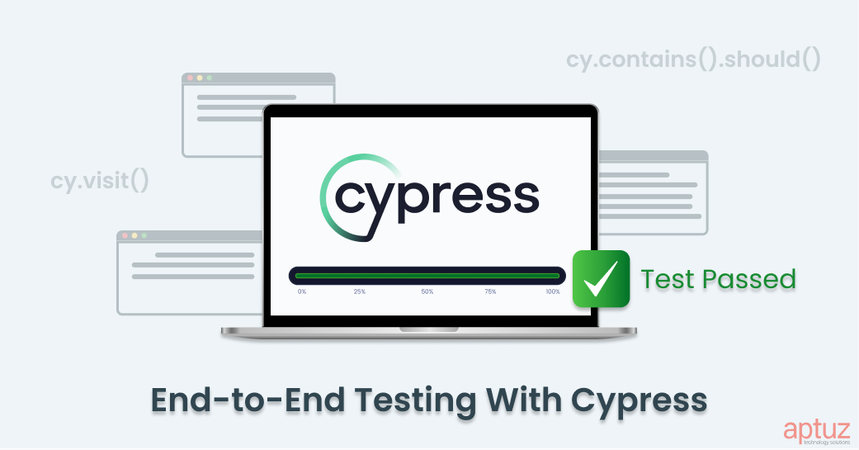If you've ever thought that testing an application could go beyond manual clicks and be achieved through code that mimics real user interactions, you're absolutely right—and this blog is for you. With the power of automated testing tools like Cypress, you can write test scripts that simulate how users navigate, interact, and engage with your application, ensuring a seamless experience without lifting a finger manually.
Before we dive deep into Cypress, it’s important to understand what End-to-End (E2E) testing is and why Cypress is an ideal tool for implementing it.
1. What is End-to-End (E2E) testing?
End-to-End (E2E) testing is a software testing methodology that validates a system functionality from a user’s perspective, covering entire workflow from start to finish to ensure that all integrated functionalities work together as expected.
Purpose of End-to-End Testing?
- Validates System Integration:
End-to-End (E2E) testing ensures that all parts of the system like the user-interface, backend and database work together as expected.
- Stimulates real-users-experience:
End-to-End (E2E) testing simulates real user interactions with the application, allowing tests to identify potential usability issues and ensure that the application behaves as expected in real-world scenarios.
2. What is Cypress?
Now that you have a basic understanding of End-to-End (E2E) testing, let us explore what Cypress is and why it is widely used for E2E testing.
Cypress is a java-script based end-to-end testing framework designed for modern web-applications. Cypress is an advanced front-end testing tool that addresses issues raised during user interaction with the application. Cypress can test anything that runs in a browser and surface insights into how to improve the health of your test suite and the quality of your application
You might get a doubt whether cypress is a framework or a testing tool. So, cypress can be used as both framework and testing tool.
Cypress as a Framework:
- It provides a complete structure to write, organize and run tests.
- It includes built-in functionalities like assertions, mocking, stubbing and test runners.
Cypress as a Testing tool:
- It provides powerful GUI (Graphical User Interface) to run and debug test cases.
- Provides features like screenshots and video recordings during the test runs.
3. Why Cypress?
Cypress is a popular choice for web automation testing due to its speed, ease of use, and reliability. It's particularly well-suited for modern web applications, offering a faster and more reliable testing experience than traditional frameworks. Cypress runs tests directly in the browser, minimizing flaky tests and providing instant feedback.
4. Installation steps for cypress:
Before installing Cypress, ensure you have a package.json file in the root of your project.
- Install Cypress via your preferred package manager like npm, yarn, and pnpm
- Commands for different package managers:
a. npm:
npm install cypress --save-dev
b. yarn:
yarn add cypress --dev
c. Pnpm:
pnpm add --save-dev cypress
Cypress supported package manager versions:

5. Functions in cypress

Example:

Explanation:
describe() → Groups the test(s)
it() → A single test case
cy.visit() → Opens the website
cy.contains().should() → Checks if text is visible on the page
You can refer for more commands here
https://docs.cypress.io/api/cypress-api/custom-commands
Conclusion and Reference:
Cypress makes end-to-end testing simple, fast, and reliable. With easy-to-read commands and real-time feedback, it allows developers to test user flows with confidence and efficiency.
Cypress provides a powerful and developer-friendly environment for writing reliable end-to-end tests. With simple syntax and real-time feedback, it streamlines the process of verifying user interactions and ensures application stability.
You can learn more about cypress from cypress official website

